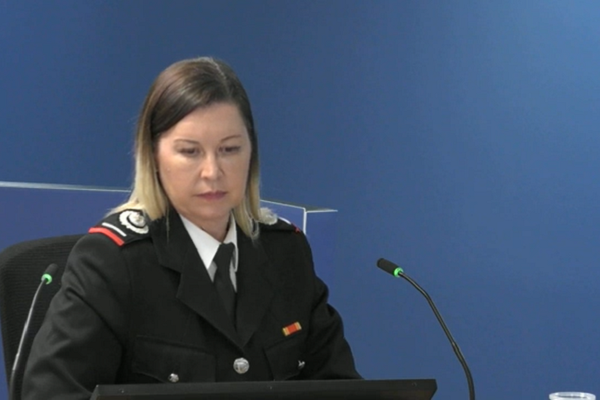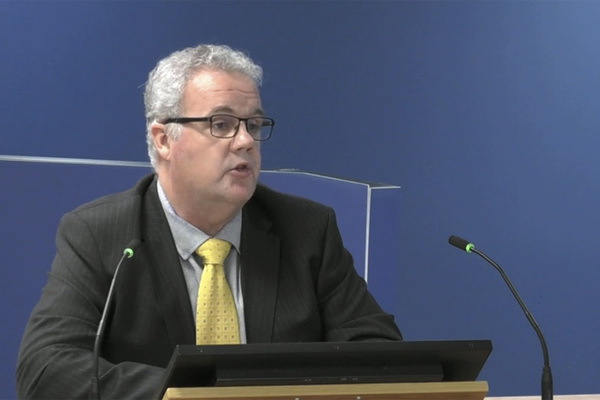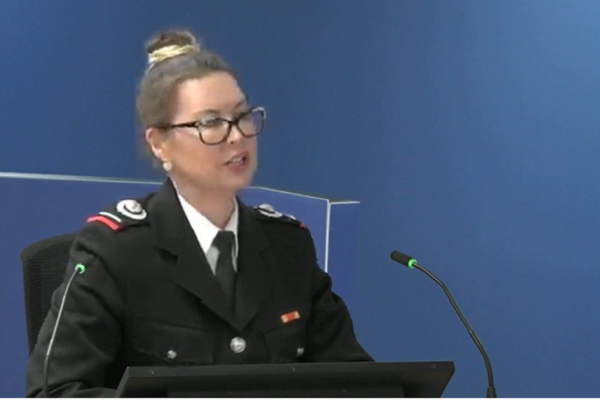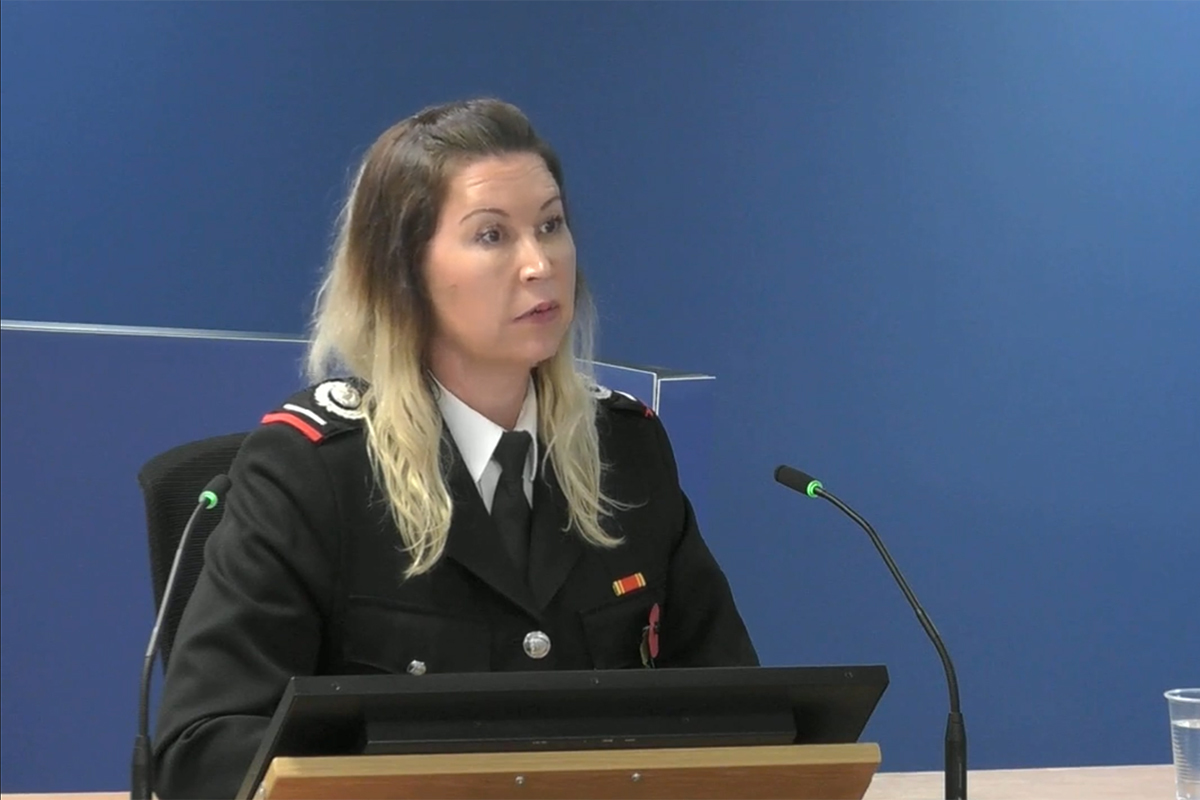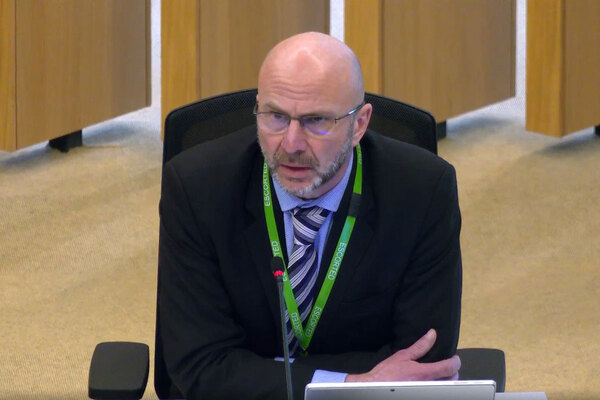Major IT problems and lack of resources hampered LFB’s efforts to train call handlers, Grenfell Inquiry hears
A senior manager in the London Fire Brigade’s (LFBs) control room told the inquiry today how a lack of “resources” and major IT problems in the mid-2010s hampered the brigade’s efforts to train staff on taking calls from residents trapped by fire.
Joanne Smith, a former senior operations manager at the LFB, was asked about the brigade’s efforts to reform training on fire survival guidance (FSG) calls (where advice is given to callers who do not believe they can escape a burning building) in the aftermath of the Lakanal House fire in 2009.
That fire had killed six people, all of whom were advised to stay put, which triggered an internal effort to learn lessons that recommended improved training for operators taking FSG calls.
But Ms Smith accepted that this new training did not pick up on the issues identified at Lakanal, was never properly rolled out, and was watered down as the LFB struggled with limited resources and major problems with a new IT system.
The advice offered to trapped callers is a major part of the Grenfell Tower Inquiry’s investigations, as it has already found “serious shortcomings” in the advice given on the night of the fire when many residents were told to stay put despite being seriously affected by smoke and fire and then later died.
Ms Smith was shown an email – first disclosed last week – where she wrote what she described as a “pretty scathing” review of the planned new training in August 2011 and warned that senior officers would “go nuts” if they saw it.
The inquiry saw sections of her criticism, including a failure in the slides to encourage call handlers to explore alternative escape routes and a lack of emphasis on the danger of telling callers firefighters will “be with you shortly” in a high-rise building.
“I feel if we were to take this powerpoint to the Lakanal board [the internal LFB team overseeing the Lakanal fire response] we would be severely criticised,” she wrote.
However, when shown new slides created in 2012, she accepted that many of the issues she raised had not been amended.
“It appears that it wasn’t updated in response to your criticism, was it?” asked counsel to the inquiry Richard Millett QC.
“It doesn’t appear so, no,” replied Ms Smith.
“Can you explain why?” asked Mr Millett.
“No,” replied Ms Smith. She said she did not regard it as her role to chase it up after she had passed her comments on to a more senior officer.
As first revealed last week, Mr Millett showed Ms Smith documents which revealed that active role-play elements in the training were reduced to passive exercises where staff watched the role play carried out and training was taken down from a full day to a four-hour exercise.
Emails show Ms Smith querying this internally and pointed out that it was inconsistent with national guidance and what the LFB had promised after the Lakanal House blaze.
She also warned in a report shortly afterwards that “it is the high-rise incidents that appear to cause difficulty and misunderstanding” with FSG calls and recommended a range of changes, including specific training for high-rise incidents. She warned that the Lakanal board “may ask questions about our training and that we are not following our own policies”.
“Here is a pretty blistering attack on FSG call handling and what is being omitted from the training,” said Mr Millett. He asked if she raised the issues with her seniors.
“I don’t know whether they made their own decisions about not following my recommendations and guidance or not, I don’t know,” she replied.
Ms Smith then left the LFB for two and a half years on secondment with the Chief Fire Officers Association, before returning in 2015 and taking on overall responsibility for the operational support team at the brigade.
As the inquiry has already heard, FSG training at this stage was not being provided to all staff. According to figures read out by Mr Millett, only 28% had taken out the training in 2013 and 29% in 2014.
In 2015, none was delivered at all due to issues with the LFB’s new IT system, Vision. Ms Smith said staff training time was occupied with sessions on how to use this new system.
Asked why she did not pick up on the concerns she had raised previously about the FSG training, she said: “I think the priority was to ensure that [LFB] had a fit, mobilising system, which when we started to look at it in very early 2015 it didn’t have. So the focus and the priority was in ensuring that the [LFB] could mobilise its fire engines.”
“It was a completely different system, something that they’d never been used to before,” she added. “It was extremely difficult and the focus and the priority was on making sure the mobilising system went live.”
Asked if the consequence of this system not working would be that fire engines “don’t appear at incidents”, she said: “Yes. We can’t record the caller information to begin with.”
In her witness statement, Ms Smith said she “consistently sent emails to the training team to remind them of the duty to conduct [FSG] training, but it became clear that the resources were not available to conduct training in the same manner that was intended in 2011”.
“Did you ask for any additional resources?” asked Mr Millett.
Ms Smith said additional staff were seconded into her department to assist, but much of their time was taken with training for the new IT system.
She was later shown a “root and branch review” of the control room written in 2016 which contained criticisms, including “a lack of regular maintenance of skills training”.
This repeated the warnings of a separate review carried out in 2010.
“Here we are in the middle of 2016 and this remains a problem,” said Mr Millett. “It had been unaddressed for the best part of six years… Did seeing that black and white come as a real concern to you?”
“As a concern, yes. Not as a surprise,” replied Ms Smith. “I believe that was due to lack of resources and had proposed several suggestions to try and address them.”
“All of which appears to have fallen on deaf ears,” said Mr Millett.
“I’m not sure on deaf ears. I think some were pursued,” she said. “But I’m sure you’ve heard there are a lot of difficulties to get over and agreements to make in terms of pursuing change in London Fire Brigade.”
Towards the end of her evidence, Ms Smith, now a deputy assistant commissioner within the LFB, was asked if she had read the conclusions of the first phase report with regard to the control room.
“Do you accept those criticisms?” asked Mr Millett.
“I accept the criticisms and that we have made great efforts and endeavours to ensure that those criticisms have been addressed especially since I’ve been in charge,” she said.
Ms Smith was present on the night of the Grenfell fire and made the decision, along with another officer, to stop telling callers to ‘stay put’ at 2.35am.
The inquiry continues.
Sign up for our weekly Grenfell Inquiry newsletter
Each week we send out a newsletter rounding up the key news from the Grenfell Inquiry, along with the headlines from the week
Already have an account? Click here to manage your newsletters
